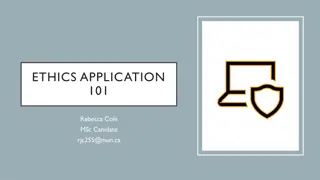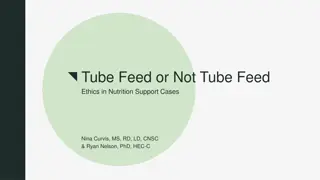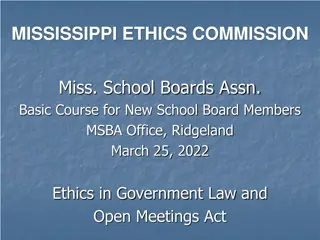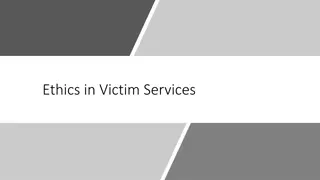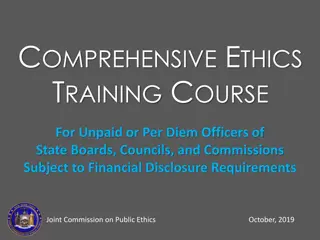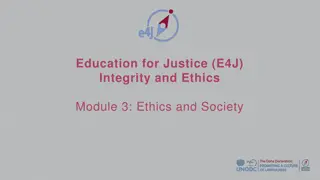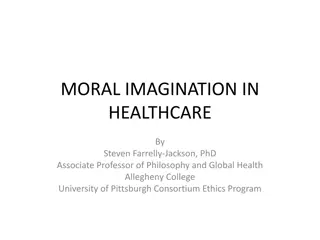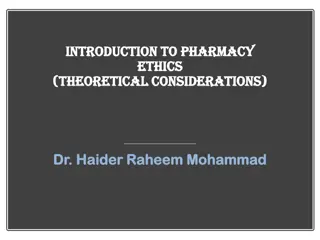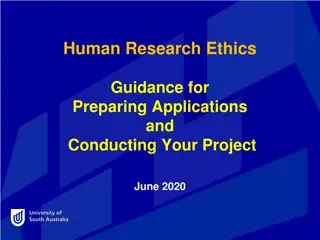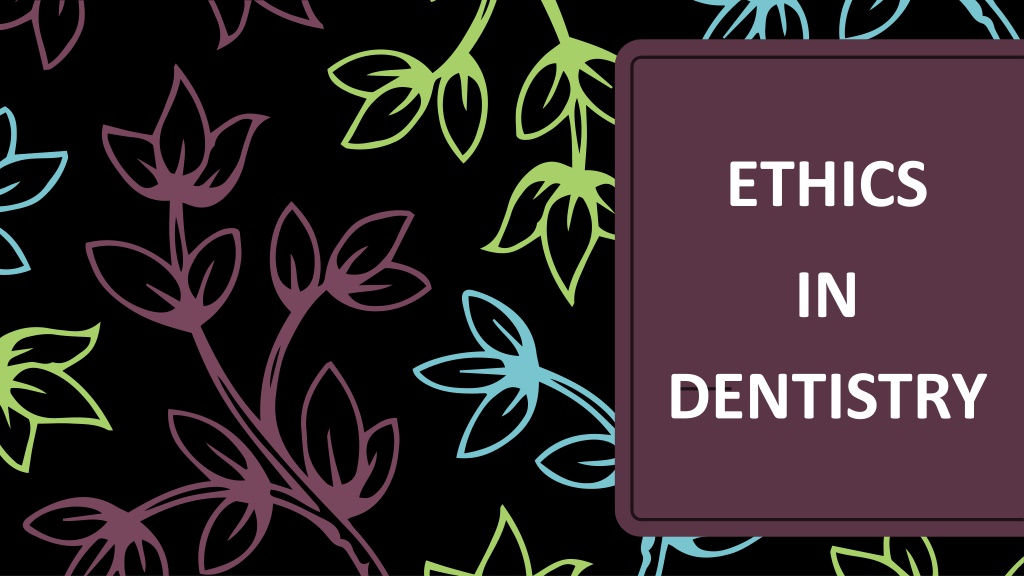
Understanding Ethics in Dentistry: Principles and Practices
Explore the concept of ethics in dentistry, derived from Greek ethos, focusing on moral duties, obligations, and principles guiding human conduct. Delve into micro and macro ethical principles, ethical codes for dentists, and the major principles like non-maleficence, beneficence, respect for persons, justice, truthfulness, and confidentiality.
Download Presentation

Please find below an Image/Link to download the presentation.
The content on the website is provided AS IS for your information and personal use only. It may not be sold, licensed, or shared on other websites without obtaining consent from the author. If you encounter any issues during the download, it is possible that the publisher has removed the file from their server.
You are allowed to download the files provided on this website for personal or commercial use, subject to the condition that they are used lawfully. All files are the property of their respective owners.
The content on the website is provided AS IS for your information and personal use only. It may not be sold, licensed, or shared on other websites without obtaining consent from the author.
E N D
Presentation Transcript
ETHICS IN DENTISTRY
Introduction Ethics is derived from the Greek word ethos meaning custom or character. Ethics is the philosophy of human conduct, a way of stating and evaluating principles by which problems of behavior can be solved. Ethics is concerned with standard judging whether actions are right or wrong.
What is Ethics? It s a branch of philosophy concerned with the study of those concepts that are used to evaluate human activities, in particular the concepts of goodness and obligation. Dental ethics would mean moral duties and obligations of the dentist towards his patients, professional colleagues and to the society.
Definition of Ethics Is defined as "the science of the ideal human character and behavior in situations where distinction must be made between right and wrong, duty must be followed and good interpersonal relations maintained".
Micro-ethical principles They focus primarily on individuals rights and duties and do not see individuals as part of a wider social order.
Macro-ethical principles These are a set of principles designed to protect the human dignity, integrity, self- determination, confidentiality, rights and health of populations and the people comprising them.
The Indian Scenario Ethical rules for Dentists were initially formed by the DCI, and the Dentist Act was amended via section 17A. The code of ethics was framed by the Dental Council in 1975 and later notified by the Government of India as Dentists Regulations 1976. It is in force from August 1976.
Ethical Principles Ethics is the part of Philosophy that deals with moral conduct and judgement, there are certain principles that the health care professional should be aware of in the practice of their profession. The major principles are: 1. To do no harm (non- Maleficence) 2. To do good (Beneficence) 3. Respect for persons 4. Justices 5. Truthfulness 6. Confidentiality
I. Duties and Obligations of the Dentist towards patient / population The first principle of medicine in the Hippocratic Oath is that the doctor s first duty is to his or her patient.
To do no harm (Non-Maleficence) It is considered to be the foundation of social morality. It is clear that although dental care professionals support this principle in theory they are at times guilty of transgressions that go beyond a limitation. For example : Iatrogenic diseases. In population based research the investigator has a dual responsibility, i.e. to the individual and to the population of which they are a part.
To do good (Beneficence) It should be the role of dentists and dental hygienists to benefit patients, as well as not to inflict harm. The expectation of the patient is that the care provider will initiate beneficial action and that there is an agreement between the doctor and patient that some good will occur. In the process of treating a patient what has to be weighed are the consequences of treatment versus no treatment, e.g.: questionable dental caries. The attempts should be to maximize the benefits and minimize harm.
Respect for persons This incorporates at least two other ethical principles of which 1. Autonomy dictates that health care professionals respect the patients capacity for self determination in making decision regarding their treatment 2. And informed consent is an essential component of a patient s right to autonomy.
Dentists sometimes attempt to direct a patient toward a particular mode of treatment stressing certain advantages and not mentioning disadvantages. It is unethical to mislead or misinform the patient. Dentists are seen as a paternalistic figure and Paternalism in health care can take the form of withholding information, restricting choices, or making the choice for the patient.
Informed Consent It is the first stated and the largest principle of the Nuremberg code. The Nuremberg code identified four attributes without which a consent cannot be considered valid. Consent must be Voluntary Legally competent Informed and Comprehending (grasp mentally/understandable)
Informed Consent This term first appeared in American Common Law in the late 1950 s. Although Consent it has been customary, since 1950 to refer it as Informed Consent . Nuremberg code calls for Voluntary
The informed consent is a two step process First information is presented to the subject by the investigator. Secondly, the subject satisfies himself or herself that he or she understands and based upon this understanding either agrees or refuses to participate in the research projects.
Justice The primary duty of the health professional is service irrespective of class, creed etc. Justice demands that each person be treated equally. It calls for an obligation to protect the weak and to ensure equity in rights and benefits, both for groups and individuals. It calls for universal coverage and for care according to need. The principle of justice in relation to health care calls for community participation in decisions and care which is effective and affordable.
Truthfulness The patient doctor relationship is based on trust. Lying shows disrespect to the patient and threatens relationship. Studies in 1950 and 1960 (on terminally ill patients) had shown that the physicians had the right, indeed duty to withhold bad news when they believed it would upset the patient. It is an example for hypocratic paternalism, that is, the doctor knows the best. Nowadays, in certain areas, there is a reversal of this dominant physical pattern.
Confidentiality Is a principle that can be traced to the Hippocratic Oath and exists today in the international code of Medical Ethics. Every patient has the right to expect that all communications and his/her care will be treated as confidential. It is very natural to want to gossip about a patient, particularly if it is someone special or possibly a neighbor, but to do so would break a bond of trust between dental professional and patient. records pertaining to
Confidentiality Earlier it was widely accepted that confidentiality could be breached if it was thought it would benefit the patient. Now patient s permission has to be taken. In no instance other than in the court of law or the patient changes confidentiality be breached. the dentist, should
Duties and Obligations of the Dentist towards the society The dentist has to assume leadership in the community on maters pertaining to dental health. People should be urged to seek care without influencing choice of dentists.
Ethical Rules for Dentists (Prescribed by the DCI) The duties and obligations of dentist towards the patients: 1. Every dentist should be sympathetic, friendly and helpful. 2. He should observe appointments. 4. He should establish a well merited reputation for professional ability. 5. The welfare of the patient should be conserved to the almost of the practitioners ability. 6. A dentist should not permit consideration of religion, nationality, race, party politics to intervene between his duties and his patients. punctuality in fulfilling his
Duties of Dentist Towards One Another 1. Every dentist should have pride in his/her colleagues disparage them either by act or word. and should not 2. When the dentist is entrusted with the care of the patient of another, during sickness or arrangement should be made. absence, mutual
3. If a dentist is consulted by the patient of another dentist and the former find that the patient is suffering from previous faulty treatment, it is his duty to institute correct treatment and in such a manner as to avoid reflection on his predecessor.
Duties of the Dentist to the Public: Police and Law courts A dentist is not bound to disclose professional secrets unless called upon by the magistrate or judge to do so. Knowledge of a patient gained in the course of examination and treatment is privileged and should not be disclosed without the consent of the patient or an order from the judge in a court of law.
Doctor-Patient Contract The legal foundation of the doctor - patient relationship is contract law. At the moment a dentist expresses a professional opinion or performs a professional act, to an individual who has reason to rely on it, the doctor patient relationship begins and the doctor is burdened with implied warranties.
Dentist may refuse to treat a patient for any reason except race, creed, color or national origin. The refusal to accept a patient based upon a persons disability may be in violation of the law. Patients suffering from AIDS, fall into the category of disabled persons and may not be refused care.
Doctor-patient relationship ends When Both parties agree to end it. Either the patient or dentist dies The patient ends it by act or statement The patient is cured The dentist unilaterally decides to terminate the care.
Implied Duties Owed by the Doctor 1. Use reasonable care in the provision of services as acceptable standards set by other practitioners with similar training in a similar community. 2. Be properly licensed and registered and meet all other legal requirements to engage in the practice of dentistry. 3. Employ competent provide for their proper supervision. measured against personnel and
4. Maintain a level of knowledge in keeping with current advances in the profession. 5. Use methods that are acceptable to at least a respectable minority of similar practitioners in the community. 6. Not use experimental procedures. 7. Obtain informed consent from the patient before instituting an examination or treatment. 8. Not abandon the patient. 9. Ensure that care is available in emergency situations. 10. Charge a reasonable fee for services based on community standards.
Keep the patient informed of his or her progress. Not undertake any procedure for which the practitioner is not qualified. Complete the care in a timely manner. Keep accurate records of the treatment.
Maintain confidentiality of information. Inform the patient of any untoward occurrences in the course of treatment. Make appropriate referrals and request necessary consultations. Practice in a manner consistent with the code of ethics of the profession.
Implied Duties Owed by the Patient 1. Home care instructions will be followed 2. Appointments will be kept 3. Bills for services will be paid in a reasonable time 4. That the patient will co-operate in the care. 5. That the patient will notify the dentist of a change in health status.
Evolution of Protection of Human Participants in Research Prior to World War II there was little concern with the treatment of human subjects / participants in research. Thus, there were no formal protections.
Nuremberg Code In 1948 the Nuremberg Code laid down 10 standards for physicians to conform to when carrying out experiments on human participants. The Nuremberg Code was the result of judgment by an American military war crimes tribunal conducting proceedings against 23 Nazi physicians and administrators for their willing participation in war crimes and crimes against humanity. The doctors had conducted medical experiments on concentration camp prisoners who died or were permanently affected as a result.
Briefly, the 10 standards of the Nuremberg code are as follows: 1. 2. Volunteers freely consent to participate Researchers fully inform volunteers concerning the study Risks associated with the study are reduced where possible Researchers are responsible for protecting participants against remote harms Participants can withdraw from the study at any time Qualified researchers conduct the study 3. 4. 5. 6.
7. Termination of the study if adverse effects emerge Society should benefit from study findings Research on humans, should be based on previous animal or other previous work 10. A research study should never begin if there is a reason to believe that death or injury may result 8. 9.
Some Unethical Practices by Dentists Practice by unregistered persons employed by the dentist. Dentists signed under his name and authority issuing any certificate, which is untrue, misleading or improper. Use of bogus diplomas. Allowing commission Dentists advertising whether directly or indirectly for the purpose of obtaining patients or promoting his own professional advantage.
Some Unethical Practices by Dentists Practice without a dental qualification Use of Dentist s name who is no longer practicing (can continue only for 1 year) A dentist practicing medicine A dentist s clinic termed as hospital Dentist s board displays a membership Use of terms like tooth puller, Denture maker etc
Some Unethical Practices by Dentists Commercial advertisements regarding practice, but dentists are allowed to advertise when they need some staff. It should be in normal type and should state only the nature of vacancy To sell physicians samples in clinic at a profit If a dentist whishes to announce in newspaper, the announcement should not contain his professional degree, announcement should not appear in more than 3 issues of the publication. his address and
Some Unethical Practices by Dentists Not informing patients regarding change of ownership, change of address Dentists name in dental health education pamphlet which is distributed to public.




